广州新版八下UnitTraditionalskills知识点
初二下册Unit 3 Traditional skills知识讲解1

Unit 3 Traditional skills词句精讲精练撰稿人:王晓丽审稿人:王红艳词汇精讲1. althoughalthough的意思相当于though,意为“尽管,虽然”,用来引导让步状语从句。
它所引导的从句不能与并列连词but; and; so等连用,但可以和yet; still等词连用。
例如:Although he lives alone, he doesn’t feel lonely.= He lives alone, but he doesn’t feel lonely.虽然他一个人住,但他并不感到孤独。
There is air all around us, although we cannot see it.虽然我们看不见空气,但空气却存在于我们的周围。
【拓展】although与though的辨析:(1) 用作连词,表示“虽然”,二者可以互换使用,但although比though更为正式。
例如:Though/Although it was raining, we still went there. 虽然下着雨,但我们还是去了那里。
(2) although一般不用作副词,而though可用作副词,且一般放在句末(不放在句首),意为“可是,不过”。
例如:It’s hard work; I enjoy it, though. 工作很辛苦,可是我很喜欢。
We all tried our best. We lost the game, though. 我们都尽力最大努力,但我们还是输了。
(3) 在as though(好像,仿佛),even though(即使,纵然)等固定短语中不能用although。
例如:He talks as though he knew everything. 他夸夸其谈,好像无所不知。
2. up toup to意为“到达(某数量、程度等)”;至多有。
例如:The temperature went up to 30℃yesterday. 昨天的气温高达30摄氏度。
广州 新版 八下 Unit 3 Traditional skills知识点归纳
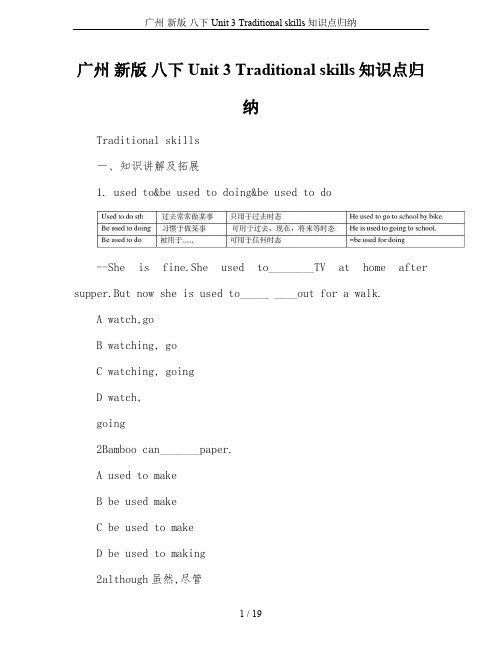
广州新版八下 Unit 3 Traditional skills知识点归纳Traditional skills一、知识讲解及拓展1. used to&be used to doing&be used to do--She is fine.She used to________TV at home after supper.But now she is used to_____ ____out for a walk.A watch,goB watching, goC watching, goingD watch,going2Bamboo can_______paper.A used to makeB be used makeC be used to makeD be used to making2although虽然,尽管与though同义,用来引导让步状语从句。
不能与but同时出现在句子。
Although比较正式,常用于句首;though多用于非正式文体,表示强调。
Eg:--The boy can speak both English and Japanese_____he is only ten.--Wow,what a clever boy.A ifB becauseC although3fit adj.健壮的,健康的v.合适,侧重于尺寸,大小合适。
To keep fit,she eats a lot of vegetables and fruits.This coat doesn’t fit me.4up to到达,至多有;up to now到现在为止=by nowHis storybooks are up to50.5set off出发,动身=set outThey set off at night.6get/be ready for为......做好准备,be ready准备好的.....Be ready to do sth准备做某事Mother gets ready for dinner. Tom is ready for the exam.Are you ready?I’m ready to go.7tie...around..栓......在......周围The girl ties a scarf around her neck.Tie to把......系在......He tied the horse to a tree.Tie up系好,捆好Please tie up your safety belt.8stop...from doing阻止.......做......=prevent...from=keep...from The heavy rain prevented/kept us from climbing the mountain.9reach& get& arrive悬挂: hang-hung-hung; 绞死,吊死: hang-hanged-hanged11 throw 短语Throw ...into 把......扔进.... Throw away 扔掉throw off 匆匆脱掉 throw at 向......扔去He threw a stone into the river. Throw away those old newspapers. Don’t throw off your coat. It’s cold outside. Tom threw stones at my dog.12 require& needThey require that I should appear. I need to buy a new bike.You needn’t come.13 no more& no longerHe is no more a student.= He isn’t a student any more.14 mistake 错误Make a mistake 犯错误by mistake 错误地,无意Mistake A for B 把A 错认成BHe makes a lot of mistakes in grammar.I took her umbrella by mistake.I often mistake Lucy for Lily.Tom left for Shanghai two weeks later.16 keep 短语Keep sb/sth + 形容词: 使......保持......; keep +形容词:保持某种状态; keep (sb) doing : 不停地做某事 Coats will keep you warm. We should keep out school clean and tidy. The shop keeps open twelve hours a day.Don’t keep talking.17 名词+y=形容词Health(健康)+y=healthy (健康的) luck(幸运)+y=lucky (幸运的)In good/bad/poor health 健康状况好/不好keep healthy 保持健康For luck 为了吉利;bad luck 倒霉 good luck 好运 18 be made from& be made ofBe made from 由......制成;看不出原材料Be made of 由......制成;看得出原材料Be made up of 由......组成Be made into 被制成..... Be made in 在......制造They made wine from rice.Paper is made from wood.The house is made of wood, The doll is made up of four parts.二、语法——被动语态英语动词有两种语态:________________和___________________。
八下英语_Unit_3_Traditionalskills要点总结

Unit 3 Traditional skills(语法:被动语态)一、找出Reading部分和Practice部分含有am/is/are done, was/were done, will be done的句子,并试着对句子进行翻译,发现其中的规律Eg: 1. The fish are then taken and thrown into a big basket by Daming.2. Cormorant fishing was once practised in lots of places in South-East China.3. A music show will be held in the school hall at 4 p.m on Tuesday, 4 May.......总结一般现在时、一般过去时和一般将来时被动语态的构成一般现在时:_____________________________________一般过去时:_____________________________________一般将来时:_____________________________________二、被动语态的概念:表示动作与主语之间是被动关系的句子是被动语态三、主动语态与被动语态之间如何转换Eg:We visited the factory last summer. →主动语态主语谓语宾语状语The factory was visited by us last summer. →被动语态主语谓语宾语状语歌诀助记1.主动、被动的时态要一致。
1)Tom often give me gifts.2)We visited the factory last year.3)He read the novel.4)We will plant a lot of trees on the hill next year.year.2.变成的被动语态的主语与谓语在单复数上保持一致。
牛津英语八下Unit3Traditional-skills知识点

Unit3 traditional skillsdescription n.说明, 形容Listen to a description of a picture.同根词: describ. v.=sa.wha.sth.I.like.giv..pictur.o.i.words描述The police asked me to describe exactly how it happened.2.fisherman n.= a person who catches fish as a job 渔夫The fisherman gets money by catching fish.同根词:Fis. v.捕鱼, 钓鱼. n.鱼(可数名词, 但单复数同形, 当指鱼的种类时, 复数形式是fishes)They are good at catching fish.搭配:Fishing rod钓鱼竿althoug. conj..thoug.虽然, 尽管Although he is over 65, he is very fit and still enjoys working.注意: although和though不能和but连用ready adj.= fully prepared or completed 准备好的= happy to do sth.乐意的, 情愿的比较级: readier 最高级: readiest搭配:Ready for准备好做某事We are ready for the journey.辨析: be ready和get ready这两个短语的共同意思是“准备”。
其区别是: 前者着重表示“准备好了”这一状态;后者着重表示“做准备”这一动作。
从下面两个句子体会:They are ready for the competition.We must get ready for it.Be ready和be prepared的区别:这两个短语都可以表示已经完成采取某种行动之前所必要的准备或具备进行某项活动的条件。
英语八年级下unit_3《traditional skills》word基础总结
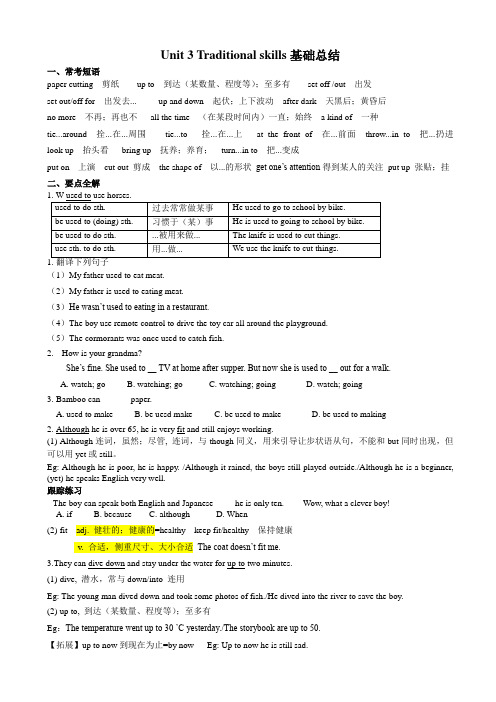
Unit 3 Traditional skills基础总结一、常考短语paper cutting 剪纸up to 到达(某数量、程度等);至多有set off /out 出发set out/off for 出发去... up and down 起伏;上下波动after dark 天黑后;黄昏后no more 不再;再也不all the time (在某段时间内)一直;始终 a kind of 一种tie...around 拴...在...周围tie...to 拴...在...上at the front of 在...前面throw...in to 把...扔进look up 抬头看bring up 抚养;养育;turn...in to 把...变成put on 上演cut out 剪成the shape of 以...的形状get one’s attention得到某人的关注put up 张贴;挂二、要点全解(1)My father used to eat meat.(2)My father is used to eating meat.(3)He wasn’t used to eating in a restaurant.(4)The boy use remote control to drive the toy car all around the playground.(5)The cormorants was once used to catch fish.2.--How is your grandma?--She’s fine. She used to __ TV at home after supper. But now she is used to __ out for a walk.A. watch; goB. watching; goC. watching; goingD. watch; going3.Bamboo can ______ paper.A. used to makeB. be uesd makeC. be used to makeD. be used to making2.Although he is over 65, he is very fit and still enjoys working.(1)Although连词,虽然;尽管, 连词,与though同义,用来引导让步状语从句,不能和but同时出现,但可以用yet或still。
广州新版八下英语unit-3-traditional-skills
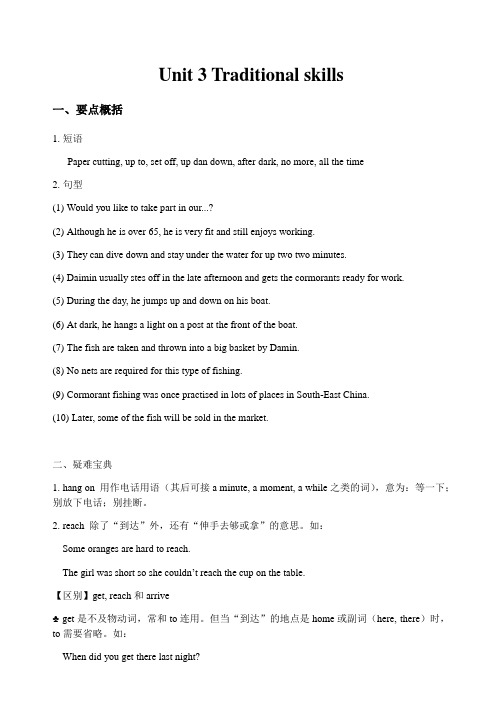
Unit 3 Traditional skills一、要点概括1.短语Paper cutting, up to, set off, up dan down, after dark, no more, all the time2.句型(1)Would you like to take part in our...?(2)Although he is over 65, he is very fit and still enjoys working.(3)They can dive down and stay under the water for up two two minutes.(4)Daimin usually stes off in the late afternoon and gets the cormorants ready for work.(5)During the day, he jumps up and down on his boat.(6)At dark, he hangs a light on a post at the front of the boat.(7)The fish are taken and thrown into a big basket by Damin.(8)No nets are required for this type of fishing.(9)Cormorant fishing was once practised in lots of places in South-East China.(10)Later, some of the fish will be sold in the market.二、疑难宝典1.hang on 用作电话用语(其后可接a minute, a moment, a while之类的词),意为:等一下;别放下电话;别挂断。
八年级下册unit3Traditionalskills知识点归纳

八年级下册unit3Traditionalskills知识点归纳unit 3 traditional skillsI 重点单词(词性变化)1. describe (v.) --- description (n.) 描述2. dive (v.) --- diving (现在分词) --- diver (名词)3. require (v.) --- requirement (n.)4. luck (n.) --- lucky (adj.) --- luckily (adv.) = fortunate (adj.)5. health (n.) --- healthy (adj.)6. hang (v.)--- hung (过去式)--- hung (过去分词)7. love (n/v)--- lovely (adj.) 8. reach --- reaches (三单)9. attract (v.)--- attraction (n.) 10. fisherman --- fishermen (复数)11. simple(adj.)--- simply (adv.)II 同义词(组)1. fit = healthy and strong 健壮的2. set off = start = set out 出发2. reach= arrive at/ get to 到达 4. hang = put it on 悬挂5. require = need 需要6. dive down= go deeper underwater 潜入7. simple = easy 简单8. although= though 虽然9. describe = say what something is like 描述10. lovely = attractive 有吸引力的11. scissors = something used to cut paper 12. no more = not…any more13. all the time = all the way = from the beginning to the endIII 重点短语1. up to 到达2. set off 出发3. up and down 起伏4. after dark 天黑后5. no more 不再6. all the time 一直7. dive down 潜入8. a piece of grass 一根草9. during the day 在白天10. tie…to 11. use sth. to do sth 12. stop sb. from doing sth13. in the late afternoon 黄昏时分14. get ready for 为…做准备15. push…into 把…推进…16. bring…back 把…带回17. throw …into 把…扔进18. at the front of…在…前面19. turn…into…把…变成IV 重点句子1. Although he is over 65, he is very fit and still enjoys working.虽然他已年过65 岁,但身体健康,依然喜欢劳作。
广州-新版-八下-Unit-3-Traditional-skills知识点
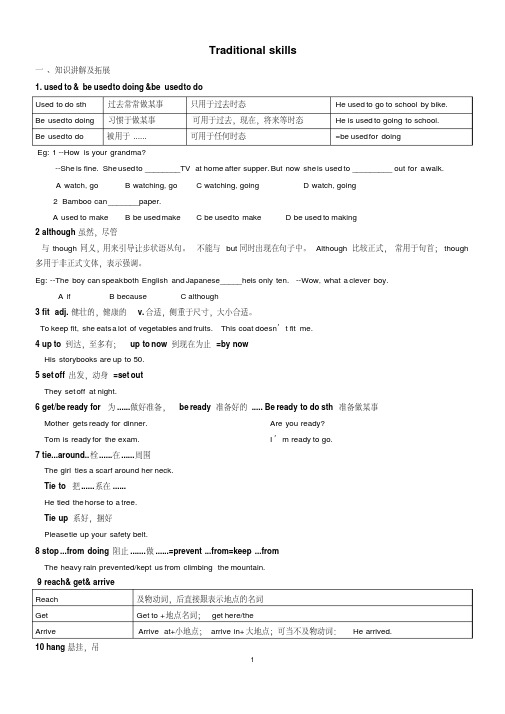
Traditional skills一、知识讲解及拓展1. used to&be usedto doing&be usedto doUsed to do sth 过去常常做某事只用于过去时态He used to go to school by bike.Be usedto doing 习惯于做某事可用于过去,现在,将来等时态He is used to going to school.Be usedto do被用于......可用于任何时态=be usedfor doingEg:1--How is your grandma?--She is fine.She usedto________TV at home after supper.But now she is used to_________out for awalk.A watch,goB watching, goC watching, goingD watch, going2Bamboo can_______paper.A used to makeB be usedmakeC be usedto makeD be used to making2although虽然,尽管与though同义,用来引导让步状语从句。
不能与but同时出现在句子中。
Although比较正式,常用于句首;though 多用于非正式文体,表示强调。
Eg:--The boy can speakboth English and Japanese_____heis only ten.--Wow,what a clever boy.A ifB becauseC although3fit adj.健壮的,健康的v.合适,侧重于尺寸,大小合适。
To keep fit,she eatsa lot of vegetables and fruits.This coat doesn’t fit me.4up to到达,至多有;up to now到现在为止=by nowHis storybooks are up to50.5set off出发,动身=set outThey set off at night.6get/be ready for为......做好准备,be ready准备好的.....Be ready to do sth准备做某事Mother gets ready for dinner. Tom is ready for the exam.Are you ready? I’m ready to go.7tie...around..栓......在......周围The girl ties a scarf around her neck.Tie to把......系在......He tied the horse to a tree.Tie up系好,捆好Pleasetie up your safety belt.8stop...from doing阻止.......做......=prevent...from=keep...fromThe heavy rain prevented/kept us from climbing the mountain.9reach& get& arriveReach及物动词,后直接跟表示地点的名词Get Get to+地点名词;get here/theArrive Arrive at+小地点;arrive in+大地点;可当不及物动词:He arrived.10 hang 悬挂,吊悬挂: hang-hung-hung; 绞死,吊死: hang-hanged-hanged11 throw短语Throw ...into 把......扔进.... Throw away 扔掉 throw off 匆匆脱掉 throw at 向......扔去He threw a stone into the river. Throw away those old newspapers. Don’tthrow off your coat. It’scold outside. Tom threw stones at my dog.12 require& needRequire 及物动词 Require to be done; require doing; require sb. to do Need 及物动词Need to do; need to be done; need doing情态动词Need doPlants require watering every day. They require that I should appear.I need to buy a new bike. The room needs to be cleaned. You needn’tcome.13 no more& no longerNo more不再常用来修饰非延续性动词,表示今后不再重复以前发生的动作,多指数量上不再增加,程度不再加深。
牛津广州版 八下 Unit 3 Traditional skills Period 1
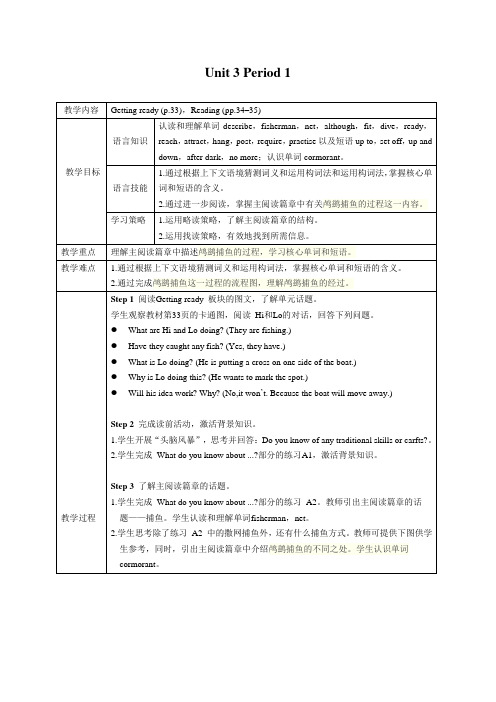
Unit 3 Period 1Step 4 运用略读策略,了解主阅读篇章的结构和大致内容。
学生快速阅读篇章,完成 Before you read 部分的练习,从而了解篇章结构。
学生认读和理解单词describe 。
Step 5 通过进一步阅读,掌握主阅读篇章的细节信息。
1.学生找读篇章的第一段,掌握主阅读篇章的细节信息。
About Wang DaminJobfisherman Ageover 65 Health fit2.学生阅读篇章的第三段,完成关于鸬鹚捕鱼的流程图。
学生认读和理解单词 dive 和短语 up to 。
3.学生阅读篇章的第三段,完成关于鸬鹚捕鱼的流程图。
学生认读和理解单词 ready , reach ,attract ,hang ,post ,require 和短语 set off ,up and down ,after dark 。
In the (1) late afternoon , Wang Damin sets off and (2) gets the cormorants ready for work.First, he (3) ties a piece of grass around their necks to stop them from eating big fish. Size: (1) largeColour: (2) black large Good at: (3) catching fish and (4)swimmingSpecial ability: can (5)dive down and stay under the water for up to two minutes。
(广州沈阳通用)八年级英语下册 Unit 3 Traditional skills(第1课时)词汇课
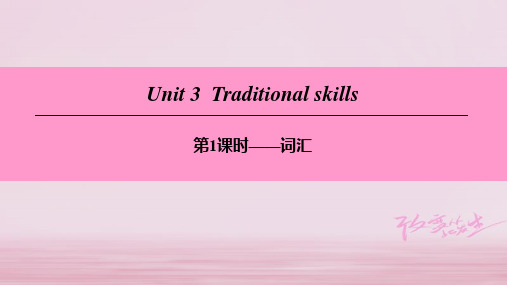
(attract)in price.
6.hang v. 悬挂;吊 After dark, he hangs a light on a post at the front of the boat. 天黑之后,他就在船头的一根杆子上挂一盏灯。 Hang your coat up on the hook. 把你的大衣挂在衣钩上。 There’s a peg near the door to hang your coat on. 门边有个钩子可以挂衣服。
【小试牛刀】
(1)他们要求我归还我之前借的那本书。
They required
to
return
the book that I borrowed before.
(2)这封信需要立刻回复。
This letter
requires
replying at
once.
8.practise v(. = work as)从事;(keep doing something regularly in order to be able to do it better)练习 Cormorant fishing was once practised in lots of places in
Unit 3 Traditional skills
第1课时——词汇
栏目导航
课时精讲 课时过关 课后拓展
重点词汇学习。 1.description n. 说明;形容
Listen to a description of a picture. 听对一个图片的描述。 He gave a description of what he saw. 他描述了他所见到的一切。
新版广州英语 初二下 U3 Traditional Skills综合复习分解

U3 Traditional Skills一.学科特色:other, others, the other, the others, another. ※ other: + n.(pl);泛指※ others: = other + n.(pl);泛指1. 两者之间:one... the other...※ the other:2. 多者之间:the other + n.(pl) / 数词= the others (特指)※ the others: = the other + n.(pl) / 数词= the rest (一定范围内,剩下所有)1. another + 可数名词单数:再,另,(三者及以上)2. another + 数词+ n.(pl) = 数词+ more + n.(pl)例:There is a flower shop on _____ side of the street. Let’s go and buy some flowersA) another B) the other C) both D) others例:There are only two students in the classroom. ____ have gone to the playground.A) The other B) The others C) Another D) Others例:I have got six colour pens. One is read, another is blue and ___ four are all green.A) other B) the others C) others D) the other例:It was a terrible accident. One passenger was killed, and ____ was badly hurt.A. the othersB. the otherC. othersD. the rest例:If you want to change for a double room,you’ll have to pay________$15.A. anotherB. otherC. moreD. each二.回顾测评:中考模拟演练语法选择二十二How do people pass on messages? When you write a letter or make a telephone call, your words take a message. People communicate with words. Do you think you can communicate without words? A smile__1__ your face shows you are happy and friendly. Tears in your eyes tell __2__ that you are sad. When you ___3__ your hand in class, the teacher knows you want to say something __4__ ask questions. You shake your head and people know you are saying no. You nod and people know you are saying yes.Other things can also give some information. __5__, a sign at the bus stop helps you to know which bus __6__. A sign on the wall of your school helps you to find the library. Signs on doors tell you how to go in or out. __7__ you ever noticed that there are a lot of signs around you and that you received messages from __8__ all the time? People can communicate in many other ways. An artist can use his drawings to tell about beautiful mountains, the blue sea and many other things. Books __9__ to tell you about all wonderful things in the world and also about people and their ideas. Books, magazines, TV and films all help us to communicate with other people. They all help us to know __10__ is going on in the world.( )1.A.in B.on C.at D.over( )2. A.others B. the others C.other D.the other( )3. A. put on B.put out C. put up D.put down( )4. A.when B.or C.but D.and( )5. A. For example B.Such as C. However D.Even though( )6. A.to get B.to go C.to have D.to take( )7. A.Do B.Did C.Had D.Have( )8. A.it B.itself C.them D.themselves( )9. A.write B.wrote C.is written D.are written( )10. A.what B.which C.that D.who三.内容呈现:1.教学重点:能熟练运用U3的短语,并熟记U3 单词的拼写和意思。
牛津广州版 八下 Unit 3 Traditional skills Period 4
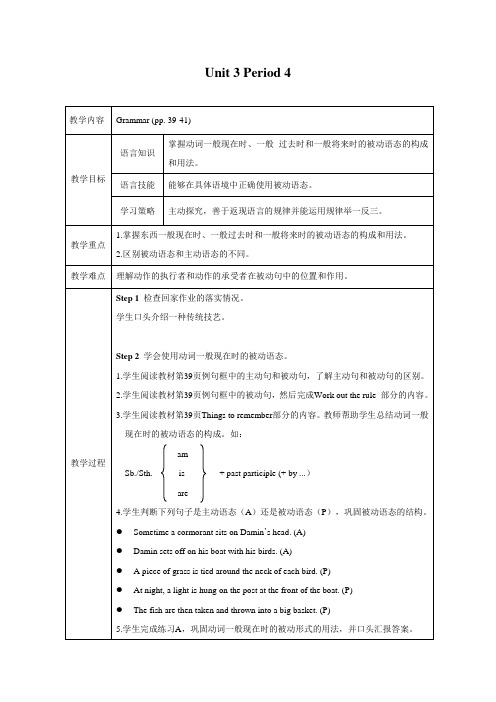
Lily sang a song at English Corner. (A song was sung by Lily at English Corner.)
The fish are then taken and thrown into a big basket. (P)
5.学生完成练习A,巩固动词一般现在时的被动形式的用法,并口头汇报答案。
Step 3学会使用动词一般过去时的被动语态。
1.学生阅读教材第40页例句框中的例句,然后完成Work out the rule部分的内容。
3.学生完成练习册B,巩固动词一般过去时的被动语态的用法,并口头汇报答案。
Step4学会使用动词一般将来时的被动语态。
1.学生阅读教材第41页的例句,然后完成Work out the rule部分的内容。
2.学生阅读教材第41页Things to remember部分的内容,了解被动语态的一般疑问句的结构。
3.学生阅读教材第39页Things to remember部分的内容。教师帮助学生总结动词一般
现在时的被动语态的构成。如:
am
Sb./Sth. is + past participle (+ by ...)
are
4.学生判断下列句子是主动语态(A)还是被动语态(P),巩固被动语态的结构。
Sometime a cormorant sits on Damin’s head. (A)
新版广州英语-初二下-U3-Traditional-Skills综合复习
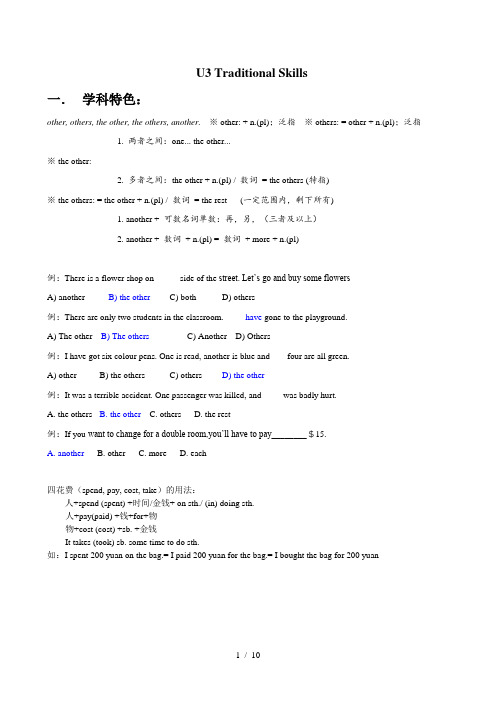
U3 Traditional Skills一.学科特色:other, others, the other, the others, another. ※ other: + n.(pl);泛指※ others: = other + n.(pl);泛指1. 两者之间:one... the other...※ the other:2. 多者之间:the other + n.(pl) / 数词= the others (特指)※ the others: = the other + n.(pl) / 数词= the rest (一定范围内,剩下所有)1. another + 可数名词单数:再,另,(三者及以上)2. another + 数词+ n.(pl) = 数词+ more + n.(pl)例:There is a flower shop on _____ side of the street. Let’s go and buy some flowersA) another B) the other C) both D) others例:There are only two students in the classroom. ____ have gone to the playground.A) The other B) The others C) Another D) Others例:I have got six colour pens. One is read, another is blue and ___ four are all green.A) other B) the others C) others D) the other例:It was a terrible accident. One passenger was killed, and ____ was badly hurt.A. the othersB. the otherC. othersD. the rest例:If you want to change for a double room,you’ll have to pay________$15.A. anotherB. otherC. moreD. each四花费(spend, pay, cost, take)的用法:人+spend (spent) +时间/金钱+ on sth./ (in) doing sth.人+pay(paid) +钱+for+物物+cost (cost) +sb. +金钱It takes (took) sb. some time to do sth.如:I spent 200 yuan on the bag.= I paid 200 yuan for the bag.= I bought the bag for 200 yuan二.回顾测评:中考模拟演练语法选择二十二How do people pass on messages? When you write a letter or make a telephone call, your words take a message. People communicate with words. Do you think you can communicate without words? A smile__1__ your face shows you are happy and friendly. Tears in your eyes tell __2__ that you are sad. When you ___3__ your hand in class, the teacher knows you want to say something __4__ ask questions. You shake your head and people know you are saying no. You nod and people know you are saying yes.Other things can also give some information. __5__, a sign at the bus stop helps you to know which bus __6__. A sign on the wall of your school helps you to find the library. Signs on doors tell you how to go in or out. __7__ you ever noticed that there are a lot of signs around you and that you received messages from __8__ all the time? People can communicate in many other ways. An artist can use his drawings to tell about beautiful mountains, the blue sea and many other things. Books __9__ to tell you about all wonderful things in the world and also about people and their ideas. Books, magazines, TV and films all help us to communicate with other people. They all help us to know __10__ is going on in the world.( )1.A.in B.on C.at D.over( )2. A.others B. the others C.other D.the other( )3. A. put on B.put out C. put up D.put down( )4. A.when B.or C.but D.and( )5. A. For example B.Such as C. However D.Even though( )6. A.to get B.to go C.to have D.to take( )7. A.Do B.Did C.Had D.Have( )8. A.it B.itself C.them D.themselves( )9. A.write B.wrote C.is written D.are written( )10. A.what B.which C.that D.who三.内容呈现:1.教学重点:能熟练运用U3的短语,并熟记U3 单词的拼写和意思。
牛津广州版 八下 Unit 3 Traditional skills Period 2
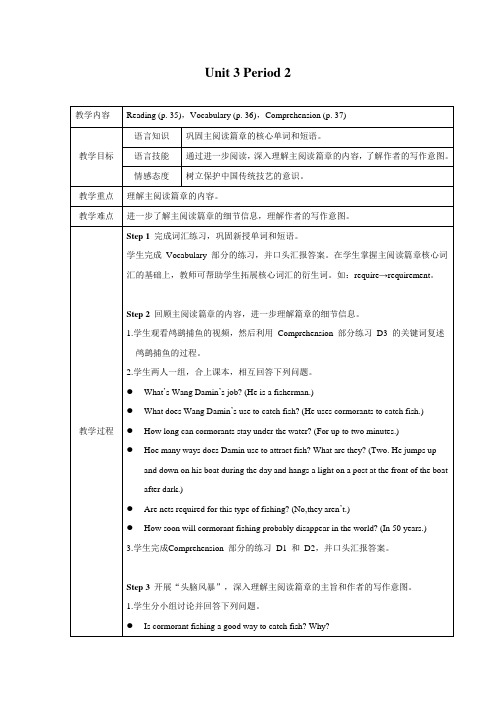
教学内容
Reading (p. 35),Vocabulary(p. 36),Comprehension(p.37)
教学目标
语言知识
巩固主阅读篇章的核心单词和短语。
语言技能
通过进一步阅读,深入理解主阅读篇章的内容,了解作者的写作意图。
情感态度
树立保护中国传统技艺的意识。
教学重点
How long can cormorants stay under the water? (For up to two minutes.)
Hoe many ways does Damin use to attract fish? What are they? (Two. He jumps up and down on his boat during the day and hangs a light on a post at the front of the boat after dark.)
理解主阅读篇章的内容。
教学难点
进一步了解主阅读篇章的细节信息,理解作者的写作意图。
教学过程
Step 1完成词汇练习,巩固新授单词和短语。
学生完成Vocabulary部分的练习,并口头汇报答案。在学生掌握主阅读篇章核心词汇的基础上,教师可帮助学生拓展核心词汇的衍生词。如:require→requirement。
Are nets required for this type of fishing? (No,they aren’t.)
How soon will cormorant fishing probably disappear in the world? (In 50 years.)
3.学生完成Comprehension部分的练习D1和D2,并口头汇报答案。
- 1、下载文档前请自行甄别文档内容的完整性,平台不提供额外的编辑、内容补充、找答案等附加服务。
- 2、"仅部分预览"的文档,不可在线预览部分如存在完整性等问题,可反馈申请退款(可完整预览的文档不适用该条件!)。
- 3、如文档侵犯您的权益,请联系客服反馈,我们会尽快为您处理(人工客服工作时间:9:00-18:30)。
Traditional skills一、知识讲解及拓展1. used to&be used to doing&be used to doEg:1--How is your grandma?--She is fine.She used to________TV at home after supper.But now she is used to_________out for a walk.A watch,goB watching, goC watching, goingD watch, going2Bamboo can_______paper.A used to makeB be used makeC be used to makeD be used to making2although虽然,尽管与though同义,用来引导让步状语从句。
不能与but同时出现在句子中。
Although比较正式,常用于句首;though 多用于非正式文体,表示强调。
Eg:--The boy can speak both English and Japanese_____he is only ten.--Wow,what a clever boy.A ifB becauseC although3fit adj.健壮的,健康的v.合适,侧重于尺寸,大小合适。
To keep fit,she eats a lot of vegetables and fruits.This coat doesn’t fit me.4up to到达,至多有;up to now到现在为止=by nowHis storybooks are up to50.5set off出发,动身=set outThey set off at night.6get/be ready for为......做好准备,be ready准备好的.....Be ready to do sth准备做某事Mother gets ready for dinner. Tom is ready for the exam.Are you ready? I’m ready to go.7tie...around..栓......在......周围The girl ties a scarf around her neck.Tie to把......系在......He tied the horse to a tree.Tie up系好,捆好Please tie up your safety belt.8stop...from doing阻止.......做......=prevent...from=keep...from The heavy rain prevented/kept us from climbing the mountain.9reach& get& arrive10 hang 悬挂,吊悬挂: hang-hung-hung; 绞死,吊死: hang-hanged-hanged11 throw 短语Throw ...into 把......扔进.... Throw away 扔掉 throw off 匆匆脱掉 throw at 向......扔去 He threw a stone into the river. Throw away those old newspapers. Don’t throw off your coat. It’s cold outside. Tom threw stones at my dog.12 require& needPlants require watering every day. They require that I should appear. I need to buy a new bike. The room needs to be cleaned.You needn’t come.13 no more& no longer He no more comes.We are no longer students.He is no more a student.= He isn’t a student any more.14 mistake 错误Make a mistake 犯错误 by mistake 错误地,无意中 Mistake A for B 把A 错认成BHe makes a lot of mistakes in grammar. I took her umbrella by mistake. I often mistake Lucy for Lily. 15 after& laterAfter two years, he died in London. Tom left for Shanghai two weeks later. 16 keep 短语Keep sb/sth + 形容词: 使......保持......; keep +形容词:保持某种状态; keep (sb) doing : 不停地做某事 Coats will keep you warm.We should keep out school clean and tidy. The shop keeps open twelve hours a day. Don’t keep talking.17 名词+y=形容词Health(健康)+y=healthy (健康的) luck(幸运)+y=lucky (幸运的) In good/bad/poor health 健康状况好/不好 keep healthy 保持健康 For luck 为了吉利; bad luck 倒霉 good luck 好运18 be made from& be made ofBe made from 由......制成;看不出原材料Be made of 由......制成;看得出原材料Be made up of 由......组成Be made into 被制成.....Be made in 在......制造They made wine from rice. Paper is made from wood. The house is made of wood, The doll is made up of four parts.19 voice& noise& sound二、语法——被动语态英语动词有两种语态:________________和___________________。
主动语态表示主语是动作的执行者,被动语态表示主语是动作的承受者。
1、被动语态的构成:英语动词的被动语态由____________________________构成。
助动词be必须与主语的人称和数量保持一致,并有时态的变化。
例如:The man was fooled by the two boys.The book has been translated into several languages.2、被动语态的用法(1)动作的执行者不知道是谁或难以说明时常用被动语态。
例如:Street lights are often turned on at six in winter.The new test book will be used next term.(2)当动作的承受者比起动作的执行者来说更能引起人们的关心而需要加以强调时,要用被动语态。
例如:This kind of bicycle is not sold in our shop.The thief was caught by a policeman yesterday.(3)含有双宾语的句子,主动句中的间接宾语或者直接宾语都可变为被动语态中的一个主语,另一个保留不变。
变为主语的若是主动句中的直接宾语在变为间接宾语前则需加介词to 或for。
例如:The pianist gave the pupils(间接宾语)some advice(直接宾语)→The pupils were given some advice by the pianist.→Some advice was given to the pupils by the pianist.(4)在主动语态句中动词make、have、let、see、watch、hear、feel等后接动词不定式作宾语补足语,动词不定式不加to。
但变成被动语态时后面的不定式都须加上to。
例如:The boss made them work ten hours a day.→ They were made to work ten hours a day.A boy saw him enter the house.→ He was seen to enter the house.3、被动语态的时态一般现在时构成:助动词be + 动词的过去分词例如:This kind of car is made in shanghai.一般过去时构成:助动词was/were + 动词的过去分词例如:The bridge was built in 1992.现在进行时构成:be + being + 动词的过去分词例如:A new bridge is being built in my hometown.过去进行时构成:was/were + being + 动词的过去分词例如:The plan was being discussed by them at that time .一般将来时构成:will/be going to do + be + 动词的过去分词例如:These books are going to be posted tomorrow. 过去将来时构成:would/was(were )going to do + be + 动词的过去分词例如:The room would be painted .现在完成时构成:助动词have/has + been + 动词的过去分词例如:Has his work been finished?过去完成时构成:助动词had + been + 动词的过去分词例如:The news had been told to him by us .带有情态动词的被动语态构成:情态动词 + be + 动词的过去分词例如:Can this walkman be repaired here?主动语态改为被动语态的步骤:①主动语态中的宾语变为被动语态句中的主语;②主动语态句中的动词改为相应的被动语态;③主动语态句中的主语变为被动语态句中by的宾语。
